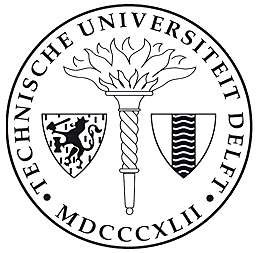Nanotechnology ("nanotech") is manipulation of matter on an atomic, molecular, and supramolecular scale. The earliest, widespread description of nanotechnology referred to the particular technological goal of precisely manipulating atoms and molecules for fabrication of macroscale products, also now referred to as molecular nanotechnology. A more generalized description of nanotechnology was subsequently established by the National Nanotechnology Initiative, which defines nanotechnology as the manipulation of matter with at least one dimension sized from 1 to 100 nanometers. This definition reflects the fact that quantum mechanical effects are important at this quantum-realm scale, and so the definition shifted from a particular technological goal to a research category inclusive of all types of research and technologies that deal with the special properties of matter which occur below the given size threshold. It is therefore common to see the plural form "nanotechnologies" as well as "nanoscale technologies" to refer to the broad range of research and applications whose common trait is size. Because of the variety of potential applications, governments have invested billions of dollars in nanotechnology research. Through 2012, the USA has invested $3.7 billion using its National Nanotechnology Initiative, the European Union has invested $1.2 billion, and Japan has invested $750 million.

Nanotechnology education involves a multidisciplinary natural science education with courses such as physics, chemistry, mathematics and molecular biology. It is being offered by many universities around the world. The first program involving nanotechnology was offered by the University of Toronto's Engineering Science program, where nanotechnology could be taken as an option.

Research institute AMOLF is part of the institutes organization of Netherlands Organisation for Scientific Research (NWO). AMOLF carries out fundamental research on the physics and design principles of natural and man-made complex matter. AMOLF uses these insights to create novel functional materials and find new solutions to societal challenges in renewable energy, green ICT and healthcare. AMOLF is located at the Amsterdam Science Park.

The Marcus Nanotechnology Building (MNB) is a Georgia Institute of Technology facility. The building was constructed on the site of the Electronics Research Building, the former home of GTRI's Information and Communications Laboratory. It was opened on April 24, 2009, as the Marcus Nanotechnology Research Center, a name it held until October 2013.

The aim of NanoLab Nijmegen is to contribute to the knowledge transfer between academia and industry, in particular to make new developments in nanoscience and technology accessible for enterprises. This is done mainly via research jobs and collaborative research projects with industry, and via workshops and training. Many of the projects employ Scanning Probe Microsocpy methods as main experimental approach.

Mihail C. Roco is the founding chair of the US National Science and Technology Council subcommittee on Nanoscale Science, Engineering and Technology (NSET), and is Senior Advisor for Science and Engineering, including Nanotechnology, at the National Science Foundation. He is also the editor in chief of the Journal of Nanoparticle Research.
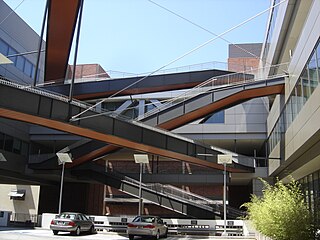
The California NanoSystems Institute (CNSI) is an integrated research center operating jointly at UCLA and UC Santa Barbara. Its missions are to foster interdisciplinary collaborations for discoveries in nanosystems and nanotechnology; train the next generation of scientists, educators and technology leaders; and facilitate partnerships with industry, fueling economic development and the social well-being of California, the United States and the world.
The Waterloo Institute for Nanotechnology (WIN) is located at the University of Waterloo and is co-located with the Institute for Quantum Computing in the Mike and Ophelia Lazaridis Quantum-Nano Centre (QNC). WIN is currently headed by Dr. Sushanta Mitra. Its inaugural director was Arthur Carty.
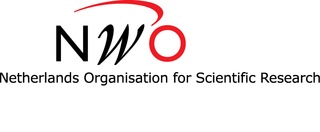
The Netherlands Organisation for Scientific Research is the national research council of the Netherlands. NWO funds thousands of top researchers at universities and institutes and steers the course of Dutch science by means of subsidies and research programmes. NWO promotes quality and innovation in science.
Albert Polman is a Dutch physicist and former director of the AMOLF research laboratory in Amsterdam.
MESA+ is the research institute for nanotechnology at the University of Twente. It consists of 500 employees including 275 PhDs and postdocs. It holds around 1250 m2 cleanroom space with some other state-of-the-art research equipment. It has a yearly turnover of about €45 million, from which about 60% comes from external sources. The management of MESA+ consists of Scientific Director and Technical Commercial Director, University Board, Scientific Advisory Board, and Supervisory Board, which assists MESA+ management whenever necessary.

Alexander A. Balandin is an electrical engineer and materials scientist known for his studies of phonons and excitons in nanostructures, experimental and theoretical investigation of thermal properties of graphene, electronic 1/f noise in novel materials and devices as well as for his works on practical applications of semiconductor nanostructures and graphene in electronics, optoelectronics and energy conversion.
The Netherlands Proteomics Centre (NPC) is a Dutch research center in the field of proteomics. The research is focused on the proteome, the entire set of proteins expressed by a genome, cell, tissue or organism.
Albert van den Berg is a Dutch physicist who works on nanotechnology-miniaturization in physics, chemistry, biology and biotechnology.
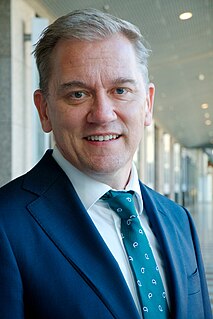
Eppo Egbert Willem Bruins is a Dutch politician and physicist. He has been a member of the House of Representatives of the Netherlands for the ChristianUnion since 2 December 2015. He previously served as director of the Technologiestichting STW between 2007 and 2015.
Huib Johan Bakker is a Dutch physicist working in the field of ultrafast spectroscopy. He has been president of research institute AMOLF since 1 February 2016.
Johanna Aaltje"Joke"Bouwstra is a Dutch researcher and professor of drug administration at Leiden University. Bouwstra has worked at the Leiden Academic Centre for Drug Research, where she has been section leader of Drug Delivery Technology.
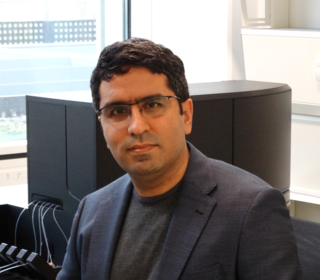
Alireza Mashaghi is a biophysicist and medical scientist at Leiden University and Harvard Medical School. He is known for his contributions to single-molecule analysis of chaperone assisted protein folding and medical systems biophysics.
Gregor Luthe is a German chemist, toxicologist, nanotechnologist, inventor and entrepreneur. He is known for his work on toxicology of PCBs and PBDEs.
